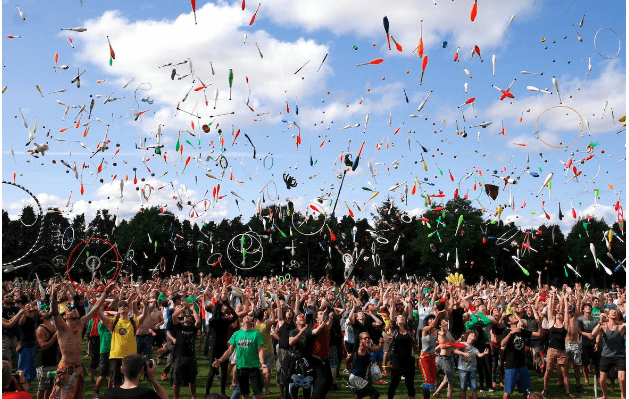The business landscape today is continuously shifting and evolving. With the growing number of competitors in the market and the rise of digital media, it has become increasingly important for companies to find ways to stand out and make a lasting impression. One of the most effective tools to retain customers and cultivate loyalty is event marketing.
THE GOALS OF EVENT MARKETING
New businesses are popping up daily and vying for customers’ attention. And with the prevalence of technology and digital marketing, customers have access to a nearly endless amount of information and options—making it more difficult for companies to retain their customers and attract target audiences.
While an effective digital marketing campaign is necessary to reach the right audience, event marketing is the perfect way to create a strong bond between customers and companies.
Event marketing refers to any kind of event or activity the company organizes to promote its product or service. These events range from smaller, more intimate gatherings such as meet-and-greets and workshops to larger conventions and expositions.
Aside from the opportunity for businesses to market their products or services, event marketing aims to create a memorable experience where customers’ positive impressions of the company can be fostered and strengthened. It is also a great way to build brand awareness and cultivate long-term relationships with audiences, thus ultimately converting them into loyal advocates.
EVENT MARKETING STRATEGIES FOR CUSTOMER RETENTION AND ENGAGEMENT
Modern customers are expecting more than just a great product or service. They want connections, inside access, value-added experiences, or anything that would make them feel valued. Therefore, creating a well-thought-out event marketing strategy is vital to strengthening the personal connection between your customer and your brand and keeping them coming back.
Here are some event marketing strategies to boost customer retention and engagement:
Personalize the Experience
Customers should feel like they’re a part of the event, not just an observer. So, make sure to create an experience tailored to your target audience’s interests and needs.
Start by identifying your target audience. Gather demographic data to develop a custom experience that resonates with them. Make them feel like VIPs by providing exclusive access to special events, creating intimate meet-and-greets with key team members, or offering personalized perks such as freebies and discounts.
Integrate Modern Technology
Integrating technology into your event can help create a more immersive and interactive experience. Hence, do not limit yourself to classic slideshows and projections. Instead, explore more modern options such as virtual reality, interactive games, artificial intelligence, and augmented reality.
For instance, have your customers scan QR codes around the venue to unlock different games or rewards. Or utilize virtual reality to transport customers to an alternate world that showcases your product or service. Technology like this can add a sense of novelty and excitement to an event, encouraging customers to attend again in the future.
Leverage Social Media
With the vast majority of people being active on social media, it’s a no-brainer that businesses should leverage social media as part of their event marketing strategy.
Create hashtags and encourage attendees to post about the event on social media to raise awareness for your brand and create an online buzz. You can also use social media platforms like Instagram, Twitter, and Facebook to post event updates and interact with customers before, during, and after to take advantage of the organic reach.
Organize a Brand-Cohesive Event
Your event should be an extension of your brand identity. Hence, you must ensure that the event’s theme, decorations, and activities are consistent with your company’s values and mission. Additionally, solidify your company’s presence by tying elements like logos, colors, or mottos to create a memorable experience for attendees.
Furthermore, organizing a cohesive event also involves creating an atmosphere that appeals to your customers. For example, if you are hosting a family-friendly event, design activities that both children and adults can enjoy. Likewise, if the event will be attended primarily by young professionals, provide entertainment and refreshments that cater to their preferences.
Infuse Unique Content with Your Events
Content is another powerful tool that can help you maximize the impact of your events. Creating unique content for each event can give your attendees a one-of-a-kind experience. Content ideas can include live demonstrations of your product, interactive activities such as workshops or Q&As, or compelling presentations by key speakers.
Moreover, consider building a microsite or blog post related to the event so that your attendees can revisit the content after the event is over. You can also use this to reach your customers who weren’t able to attend the event.
Collaborate with Influencers
Influencers have a built-in audience they can tap into to spread awareness of your event. They also have the ability to create content that appeals to their followers and helps generate enthusiasm for the event.
However, it’s important to find influencers who are passionate about your brand, industry, or event topic. For instance, if you are hosting a tech seminar, look for an influencer who is knowledgeable in that field and has an established following. Reach out to them and offer incentives such as free tickets or special activities in exchange for their help in promoting your event.
FINAL TIP
There’s no one-size-fits-all approach when it comes to event marketing strategies. You’ll have to experiment with different tactics, track the results of each event and use the insights you gain to improve future events to create a strategy that works best for your company and customers.
Ultimately, be creative. Events don’t have to be just a boring sales pitch—they should be fun and engaging experiences that provide value beyond the product or service you offer. Keep in mind that customers should be getting something out of your event that they can’t find anywhere else, so come up with imaginative ways to make your events stand out.
With the right approach, you can use events to effectively engage with your customers and build loyalty.



